Abstract
Aldose reductase (EC 1.1.1.21) catalyzes the NADPH-mediated conversion of glucose to sorbitol. The hyperglycemia of diabetes increases sorbitol production primarily through substrate availability and is thought to contribute to the pathogenesis of many diabetic complications. Increased sorbitol production can also occur at normoglycemic levels via rapid increases in aldose reductase transcription and expression, which have been shown to occur upon exposure of many cell types to hyperosmotic conditions. The induction of aldose reductase transcription and the accumulation of sorbitol, an organic osmolyte, have been shown to be part of the physiological osmoregulatory mechanism whereby renal tubular cells adjust to the intraluminal hyperosmolality during urinary concentration. Previously, to explore the mechanism regulating aldose reductase levels, we partially characterized the human aldose reductase gene promoter present in a 4.2-kb fragment upstream of the transcription initiation start site. A fragment (-192 to +31 bp) was shown to contain several elements that control the basal expression of the enzyme. In this study, we examined the entire 4.2-kb human AR gene promoter fragment by deletion mutagenesis and transfection studies for the presence of osmotic response enhancer elements. An 11-bp nucleotide sequence (TGGAAAATTAC) was located 3.7 kb upstream of the transcription initiation site that mediates hypertonicity-responsive enhancer activity. This osmotic response element (ORE) increased the expression of the chloramphenicol acetyltransferase reporter gene product 2-fold in transfected HepG2 cells exposed to hypertonic NaCl media as compared with isoosmotic media. A more distal homologous sequence is also described; however, this sequence has no osmotic enhancer activity in transfected cells. Specific ORE mutant constructs, gel shift, and DNA fragment competition studies confirm the nature of the element and identify specific nucleotides essential for enhancer activity. A plasmid construct containing three repeat OREs and a heterologous promoter increased expression 8-fold in isoosmotic media and an additional 4-fold when the transfected cells are subjected to hyperosmotic stress (total approximately 30-fold). These findings will permit future studies to identify the transcription factors involved in the normal regulatory response mechanism to hypertonicity and to identify whether and how this response is altered in a variety of pathologic states, including diabetes.
Full text
PDF
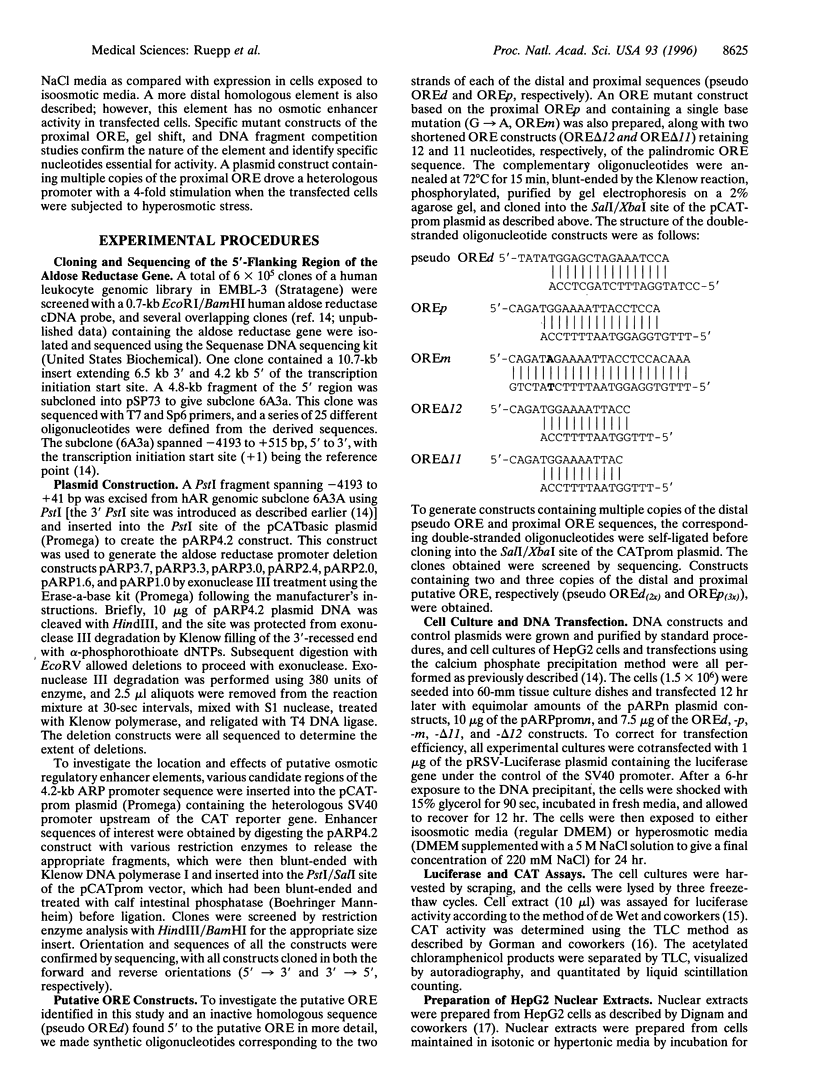
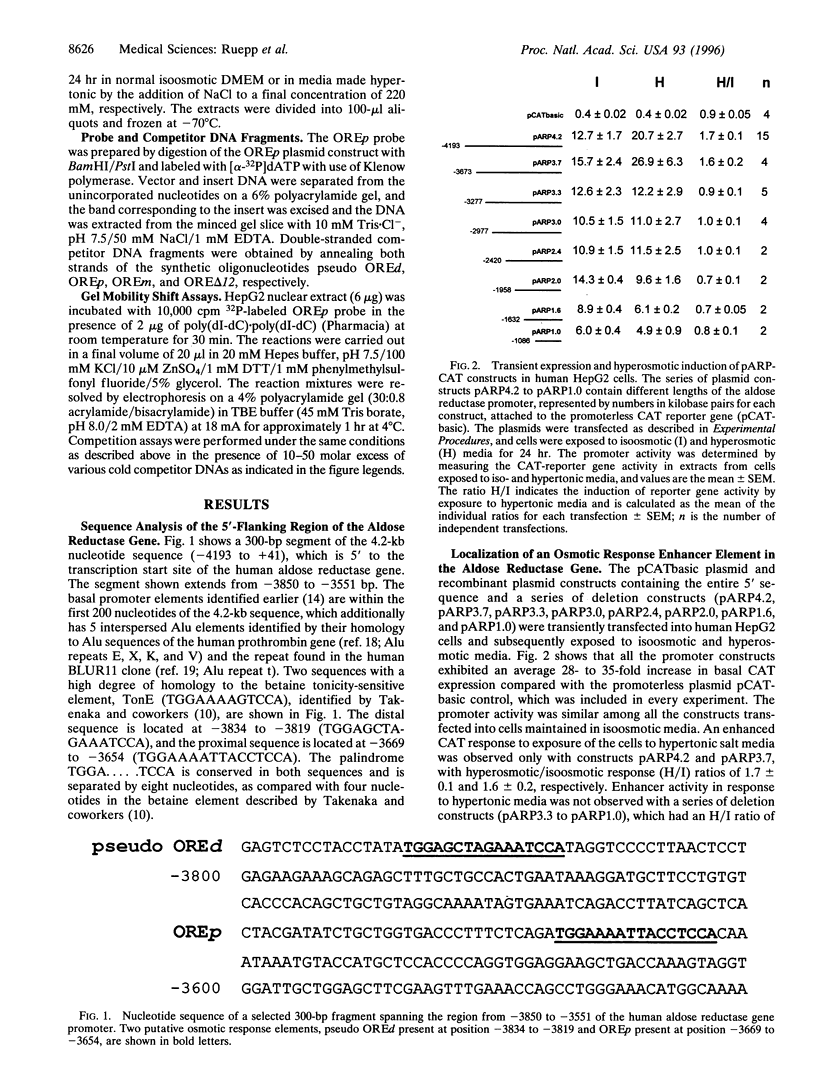
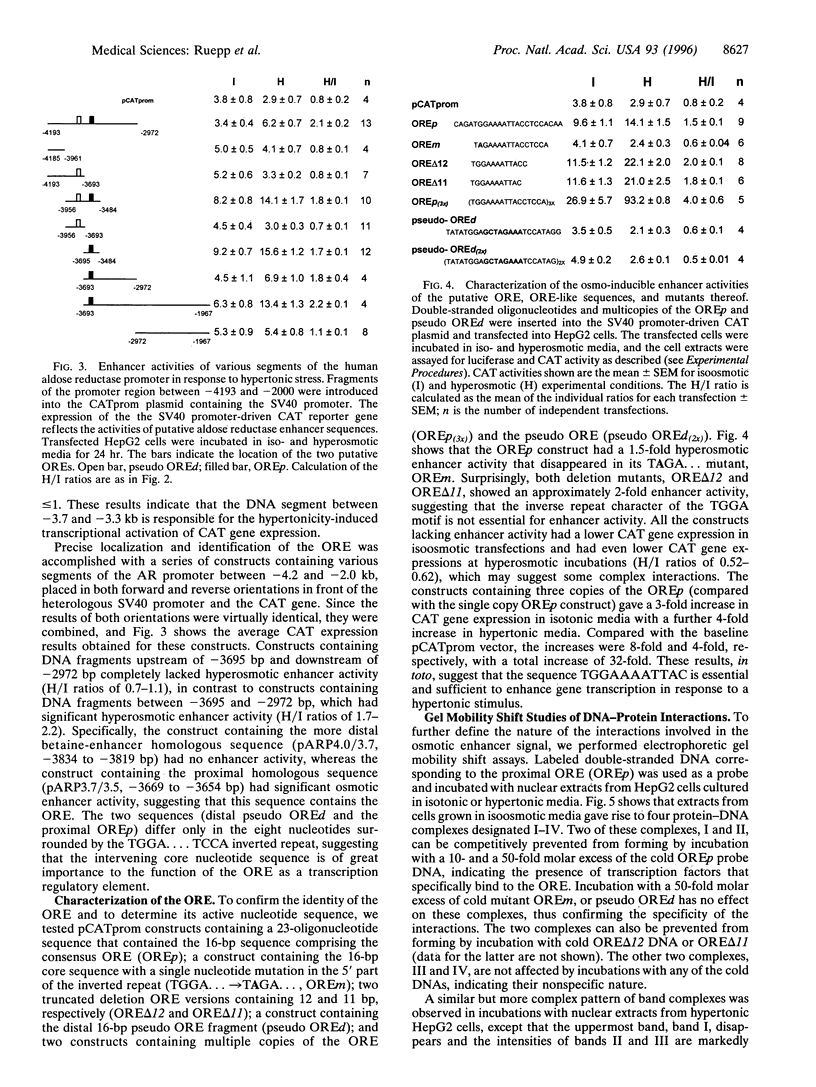
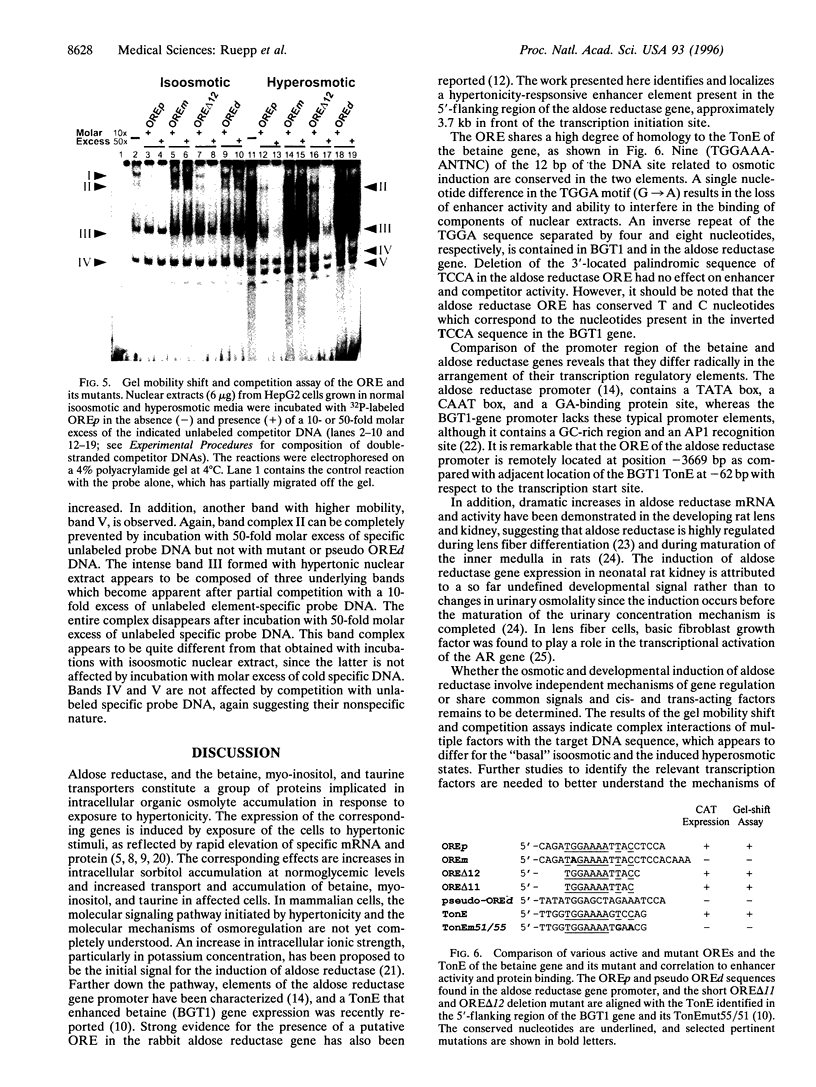
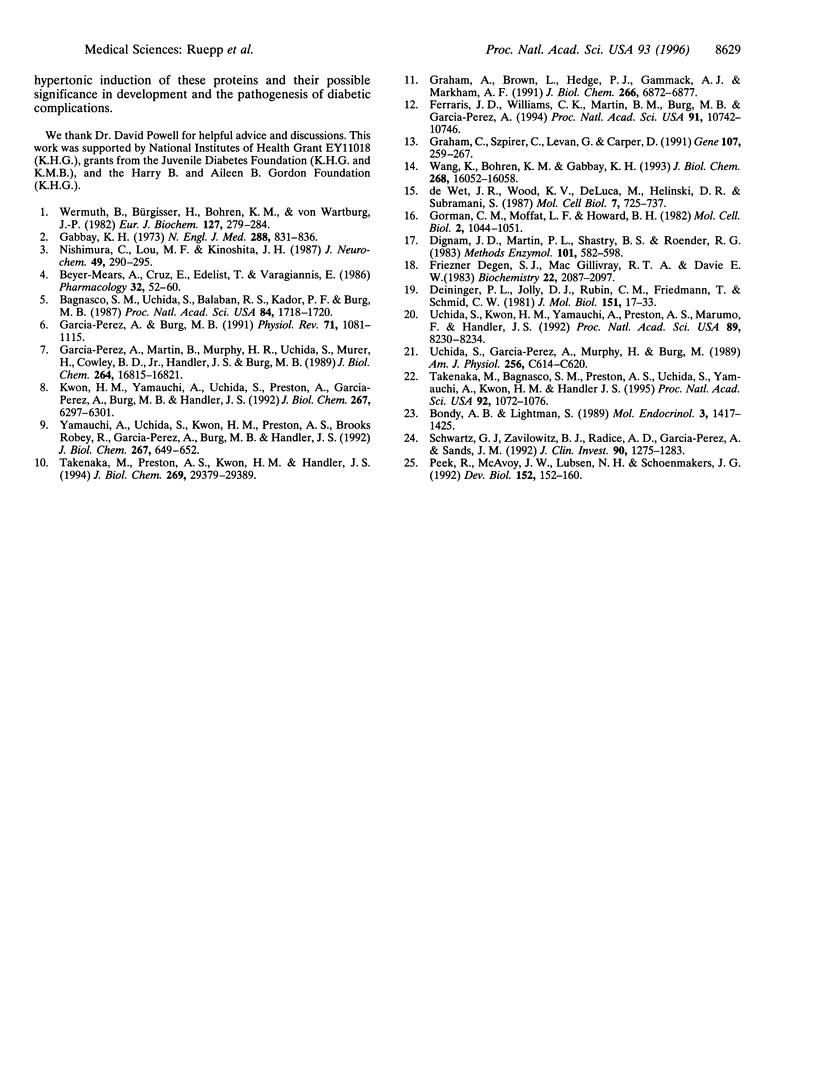
Images in this article
Selected References
These references are in PubMed. This may not be the complete list of references from this article.
- Bagnasco S. M., Uchida S., Balaban R. S., Kador P. F., Burg M. B. Induction of aldose reductase and sorbitol in renal inner medullary cells by elevated extracellular NaCl. Proc Natl Acad Sci U S A. 1987 Mar;84(6):1718–1720. doi: 10.1073/pnas.84.6.1718. [DOI] [PMC free article] [PubMed] [Google Scholar]
- Beyer-Mears A., Cruz E., Edelist T., Varagiannis E. Diminished proteinuria in diabetes mellitus by sorbinil, an aldose reductase inhibitor. Pharmacology. 1986;32(1):52–60. doi: 10.1159/000138152. [DOI] [PubMed] [Google Scholar]
- Bondy C. A., Lightman S. L. Developmental and physiological pattern of aldose reductase mRNA expression in lens and retina. Mol Endocrinol. 1989 Sep;3(9):1417–1425. doi: 10.1210/mend-3-9-1417. [DOI] [PubMed] [Google Scholar]
- Degen S. J., MacGillivray R. T., Davie E. W. Characterization of the complementary deoxyribonucleic acid and gene coding for human prothrombin. Biochemistry. 1983 Apr 26;22(9):2087–2097. doi: 10.1021/bi00278a008. [DOI] [PubMed] [Google Scholar]
- Deininger P. L., Jolly D. J., Rubin C. M., Friedmann T., Schmid C. W. Base sequence studies of 300 nucleotide renatured repeated human DNA clones. J Mol Biol. 1981 Sep 5;151(1):17–33. doi: 10.1016/0022-2836(81)90219-9. [DOI] [PubMed] [Google Scholar]
- Dignam J. D., Martin P. L., Shastry B. S., Roeder R. G. Eukaryotic gene transcription with purified components. Methods Enzymol. 1983;101:582–598. doi: 10.1016/0076-6879(83)01039-3. [DOI] [PubMed] [Google Scholar]
- Ferraris J. D., Williams C. K., Martin B. M., Burg M. B., García-Pérez A. Cloning, genomic organization, and osmotic response of the aldose reductase gene. Proc Natl Acad Sci U S A. 1994 Oct 25;91(22):10742–10746. doi: 10.1073/pnas.91.22.10742. [DOI] [PMC free article] [PubMed] [Google Scholar]
- Gabbay K. H. The sorbitol pathway and the complications of diabetes. N Engl J Med. 1973 Apr 19;288(16):831–836. doi: 10.1056/NEJM197304192881609. [DOI] [PubMed] [Google Scholar]
- Garcia-Perez A., Burg M. B. Renal medullary organic osmolytes. Physiol Rev. 1991 Oct;71(4):1081–1115. doi: 10.1152/physrev.1991.71.4.1081. [DOI] [PubMed] [Google Scholar]
- Garcia-Perez A., Martin B., Murphy H. R., Uchida S., Murer H., Cowley B. D., Jr, Handler J. S., Burg M. B. Molecular cloning of cDNA coding for kidney aldose reductase. Regulation of specific mRNA accumulation by NaCl-mediated osmotic stress. J Biol Chem. 1989 Oct 5;264(28):16815–16821. [PubMed] [Google Scholar]
- Gorman C. M., Moffat L. F., Howard B. H. Recombinant genomes which express chloramphenicol acetyltransferase in mammalian cells. Mol Cell Biol. 1982 Sep;2(9):1044–1051. doi: 10.1128/mcb.2.9.1044. [DOI] [PMC free article] [PubMed] [Google Scholar]
- Graham A., Brown L., Hedge P. J., Gammack A. J., Markham A. F. Structure of the human aldose reductase gene. J Biol Chem. 1991 Apr 15;266(11):6872–6877. [PubMed] [Google Scholar]
- Graham C., Szpirer C., Levan G., Carper D. Characterization of the aldose reductase-encoding gene family in rat. Gene. 1991 Nov 15;107(2):259–267. doi: 10.1016/0378-1119(91)90326-7. [DOI] [PubMed] [Google Scholar]
- Kwon H. M., Yamauchi A., Uchida S., Preston A. S., Garcia-Perez A., Burg M. B., Handler J. S. Cloning of the cDNa for a Na+/myo-inositol cotransporter, a hypertonicity stress protein. J Biol Chem. 1992 Mar 25;267(9):6297–6301. [PubMed] [Google Scholar]
- Nishimura C., Lou M. F., Kinoshita J. H. Depletion of myo-inositol and amino acids in galactosemic neuropathy. J Neurochem. 1987 Jul;49(1):290–295. doi: 10.1111/j.1471-4159.1987.tb03428.x. [DOI] [PubMed] [Google Scholar]
- Peek R., McAvoy J. W., Lubsen N. H., Schoenmakers J. G. Rise and fall of crystallin gene messenger levels during fibroblast growth factor induced terminal differentiation of lens cells. Dev Biol. 1992 Jul;152(1):152–160. doi: 10.1016/0012-1606(92)90165-d. [DOI] [PubMed] [Google Scholar]
- Schwartz G. J., Zavilowitz B. J., Radice A. D., Garcia-Perez A., Sands J. M. Maturation of aldose reductase expression in the neonatal rat inner medulla. J Clin Invest. 1992 Oct;90(4):1275–1283. doi: 10.1172/JCI115991. [DOI] [PMC free article] [PubMed] [Google Scholar]
- Takenaka M., Bagnasco S. M., Preston A. S., Uchida S., Yamauchi A., Kwon H. M., Handler J. S. The canine betaine gamma-amino-n-butyric acid transporter gene: diverse mRNA isoforms are regulated by hypertonicity and are expressed in a tissue-specific manner. Proc Natl Acad Sci U S A. 1995 Feb 14;92(4):1072–1076. doi: 10.1073/pnas.92.4.1072. [DOI] [PMC free article] [PubMed] [Google Scholar]
- Takenaka M., Preston A. S., Kwon H. M., Handler J. S. The tonicity-sensitive element that mediates increased transcription of the betaine transporter gene in response to hypertonic stress. J Biol Chem. 1994 Nov 25;269(47):29379–29381. [PubMed] [Google Scholar]
- Uchida S., Garcia-Perez A., Murphy H., Burg M. Signal for induction of aldose reductase in renal medullary cells by high external NaCl. Am J Physiol. 1989 Mar;256(3 Pt 1):C614–C620. doi: 10.1152/ajpcell.1989.256.3.C614. [DOI] [PubMed] [Google Scholar]
- Uchida S., Kwon H. M., Yamauchi A., Preston A. S., Marumo F., Handler J. S. Molecular cloning of the cDNA for an MDCK cell Na(+)- and Cl(-)-dependent taurine transporter that is regulated by hypertonicity. Proc Natl Acad Sci U S A. 1992 Sep 1;89(17):8230–8234. doi: 10.1073/pnas.89.17.8230. [DOI] [PMC free article] [PubMed] [Google Scholar]
- Wang K., Bohren K. M., Gabbay K. H. Characterization of the human aldose reductase gene promoter. J Biol Chem. 1993 Jul 25;268(21):16052–16058. [PubMed] [Google Scholar]
- Wermuth B., Bürgisser H., Bohren K., von Wartburg J. P. Purification and characterization of human-brain aldose reductase. Eur J Biochem. 1982 Oct;127(2):279–284. doi: 10.1111/j.1432-1033.1982.tb06867.x. [DOI] [PubMed] [Google Scholar]
- Yamauchi A., Uchida S., Kwon H. M., Preston A. S., Robey R. B., Garcia-Perez A., Burg M. B., Handler J. S. Cloning of a Na(+)- and Cl(-)-dependent betaine transporter that is regulated by hypertonicity. J Biol Chem. 1992 Jan 5;267(1):649–652. [PubMed] [Google Scholar]
- de Wet J. R., Wood K. V., DeLuca M., Helinski D. R., Subramani S. Firefly luciferase gene: structure and expression in mammalian cells. Mol Cell Biol. 1987 Feb;7(2):725–737. doi: 10.1128/mcb.7.2.725. [DOI] [PMC free article] [PubMed] [Google Scholar]



